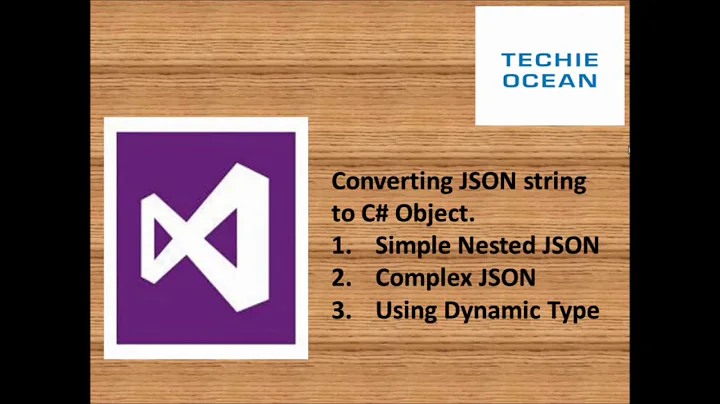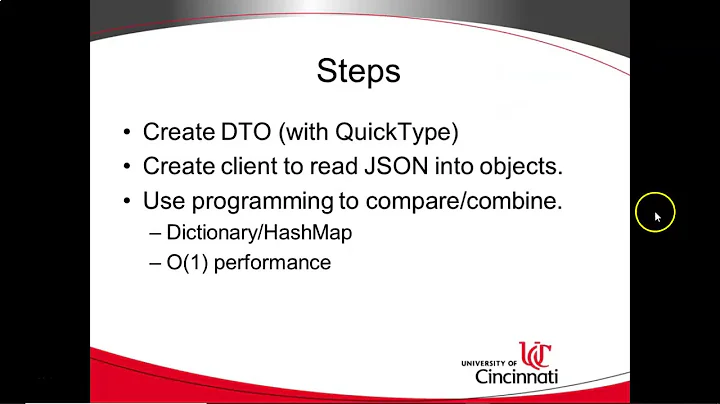How do I convert a dictionary to a JSON String in C#?
Solution 1
Serializing data structures containing only numeric or boolean values is fairly straightforward. If you don't have much to serialize, you can write a method for your specific type.
For a Dictionary<int, List<int>> as you have specified, you can use Linq:
string MyDictionaryToJson(Dictionary<int, List<int>> dict)
{
var entries = dict.Select(d =>
string.Format("\"{0}\": [{1}]", d.Key, string.Join(",", d.Value)));
return "{" + string.Join(",", entries) + "}";
}
But, if you are serializing several different classes, or more complex data structures, or especially if your data contains string values, you would be better off using a reputable JSON library that already knows how to handle things like escape characters and line breaks. Json.NET is a popular option.
Solution 2
This answer mentions Json.NET but stops short of telling you how you can use Json.NET to serialize a dictionary:
return JsonConvert.SerializeObject( myDictionary );
As opposed to JavaScriptSerializer, myDictionary does not have to be a dictionary of type <string, string> for JsonConvert to work.
Solution 3
Json.NET probably serializes C# dictionaries adequately now, but when the OP originally posted this question, many MVC developers may have been using the JavaScriptSerializer class because that was the default option out of the box.
If you're working on a legacy project (MVC 1 or MVC 2), and you can't use Json.NET, I recommend that you use a List<KeyValuePair<K,V>> instead of a Dictionary<K,V>>. The legacy JavaScriptSerializer class will serialize this type just fine, but it will have problems with a dictionary.
Documentation: Serializing Collections with Json.NET
Solution 4
Simple One-Line Answer
(using System.Web.Script.Serialization )
This code will convert any Dictionary<Key,Value> to Dictionary<string,string> and then serialize it as a JSON string:
var json = new JavaScriptSerializer().Serialize(yourDictionary.ToDictionary(item => item.Key.ToString(), item => item.Value.ToString()));
It is worthwhile to note that something like Dictionary<int, MyClass> can also be serialized in this way while preserving the complex type/object.
Explanation (breakdown)
var yourDictionary = new Dictionary<Key,Value>(); //This is just to represent your current Dictionary.
You can replace the variable yourDictionary with your actual variable.
var convertedDictionary = yourDictionary.ToDictionary(item => item.Key.ToString(), item => item.Value.ToString()); //This converts your dictionary to have the Key and Value of type string.
We do this, because both the Key and Value has to be of type string, as a requirement for serialization of a Dictionary.
var json = new JavaScriptSerializer().Serialize(convertedDictionary); //You can then serialize the Dictionary, as both the Key and Value is of type string, which is required for serialization.
Solution 5
using System;
using System.Collections.Generic;
using System.Linq;
using System.Text;
using System.Runtime.Serialization.Json;
using System.IO;
namespace ConsoleApplication1
{
class Program
{
static void Main(string[] args)
{
Dictionary<int, List<int>> foo = new Dictionary<int, List<int>>();
foo.Add(1, new List<int>( new int[] { 1, 2, 3, 4 }));
foo.Add(2, new List<int>(new int[] { 2, 3, 4, 1 }));
foo.Add(3, new List<int>(new int[] { 3, 4, 1, 2 }));
foo.Add(4, new List<int>(new int[] { 4, 1, 2, 3 }));
DataContractJsonSerializer serializer = new DataContractJsonSerializer(typeof(Dictionary<int, List<int>>));
using (MemoryStream ms = new MemoryStream())
{
serializer.WriteObject(ms, foo);
Console.WriteLine(Encoding.Default.GetString(ms.ToArray()));
}
}
}
}
This will write to the console:
[{\"Key\":1,\"Value\":[1,2,3,4]},{\"Key\":2,\"Value\":[2,3,4,1]},{\"Key\":3,\"Value\":[3,4,1,2]},{\"Key\":4,\"Value\":[4,1,2,3]}]
Related videos on Youtube
daehaai
Updated on September 04, 2021Comments
-
daehaai over 2 years
I want to convert my
Dictionary<int,List<int>>to JSON string. Does anyone know how to achieve this in C#?-
 RayLoveless over 5 yearsUse newtonSoft.json nuget package. JsonConvert.SerializeObject(yourObject)
RayLoveless over 5 yearsUse newtonSoft.json nuget package. JsonConvert.SerializeObject(yourObject)
-
-
TheDOSandDONTS about 13 yearsare dictionaries serializeable?
-
Twelve47 about 13 yearsI would have thought this would work - string json = serializer.Serialize((object)dict);
-
daehaai about 13 yearsI think this works better in my case as its is simple. All I need to do now is to use JSON.parse() (in javascript) in my javascript and I have my data struct ready . thx
-
Pavel Chuchuva over 12 yearsIt throws ArgumentException: Type 'System.Collections.Generic.Dictionary`2 is not supported for serialization/deserialization of a dictionary, keys must be strings or objects.
-
Pavel Chuchuva over 12 years
-
jacobsimeon over 11 yearsThis solution is naive at best. Use a real json serialization library.
-
gilly3 over 11 years@Jacob - Naive? Ouch. Personally, I can't justify including another assembly when all I need to do can be accomplished with one short and simple method.
-
Gomes about 11 yearsPerfect answer for asp.net mvc3 and mvc4 users
-
Léon Pelletier almost 11 yearsOne more + on gilly3 comment. Sometime you're coding on Windows Phone. You're adding zlip, twitter, google, audio processing stuff, image processing stuff. You're better implement simple method like it, and some basic HttpRequests for social media interaction if your usage is simple. When adding an assembly, you always have to deal with bugs, and with the impossibility of getting a lite version. By the way, inside json libs, there are naive methods like this and no magic.
-
Léon Pelletier almost 11 yearsThere should be a page on every open project telling you: "Hey, most of the time, you'll only want to execute this 10 lines algo. Here's the code."
-
EternalWulf almost 10 years@Numenor Yes, they are, but only if the Key AND Value are of type
string. I have posted an answer here that includes that, if you want to have a look. -
 Sleeper Smith over 9 yearsdict.add("RandomKey\"", "RandomValue\""); BOOOOOOOOOOOOOOOOM. Naive at best. Use a real json serialization library.
Sleeper Smith over 9 yearsdict.add("RandomKey\"", "RandomValue\""); BOOOOOOOOOOOOOOOOM. Naive at best. Use a real json serialization library. -
Jonny over 9 yearsWhat's a LINQ? There is nothing that doesn't require foreign library?
-
Jonny over 9 yearsI don't have JavaScriptSerializer in my C#.
-
gilly3 over 9 years@jonny - LINQ is built in to .Net. It is not a foreign library.
-
James Newton-King about 9 yearsThis is not a good answer for dictionaries with string keys or values. Double quotes, slashes and line breaks will all result in broken JSON. It should be updated to include a warning.
-
gilly3 about 9 years@JamesNewton-King - Done. Funny, I was legitimately confused by Jacob's comment, and its accompanying upvotes. I was baffled again by Sleeper's comment, but it at least got me thinking. It never even occurred to me that readers were considering my method for serializing strings. "Of course this is a bad approach for strings", I thought, "that's obvious." I now understand the haters. This question probably ranks highly in search results for serializing dictionaries, but my answer isn't a great general purpose answer for serializing any
IDictionary<TKey, TValue>. Sorry to have been so blind! -
 Gyum Fox over 8 years@HowlinWulf to be more exact, the value doesn't have to be a string. But for the key, it cannot definitely be an int. Strings work best as key.
Gyum Fox over 8 years@HowlinWulf to be more exact, the value doesn't have to be a string. But for the key, it cannot definitely be an int. Strings work best as key. -
StingyJack over 8 yearsJsonConvert.SerializeObject does not appear to handle serializing c# dictionaries to a type of enumerable collection when read back into Javascript. Rather, it makes an object where each pair in the C# collection is now a plain property/value in an object, that cant be easily enumerated like a collection. So, unless I have a bad version from nuget, Json.NET is still not adequate.in this regard.
-
StingyJack over 8 yearsOh, yes. I was doing a similar thing already, but trying to find out another way, and stumbled upon this. I felt it may be useful to let others know to avoid the Json.NET rabbit hole for this item (works great otherwise).
-
 aminhotob over 8 years@Jonny you are missing reference assembly System.Web.Extensions msdn.microsoft.com/en-us/library/…
aminhotob over 8 years@Jonny you are missing reference assembly System.Web.Extensions msdn.microsoft.com/en-us/library/… -
vapcguy about 7 yearsI referenced
System.Coreand then tried to referenceusing Newtonsoft.Jsonand no joy. I thinkNewtonsoftis a 3rd-party library. -
vapcguy about 7 yearsI've read that
System.Web.Extensionsis not in the Client Framework version, but requires the full version, too. -
 Skorunka František about 7 years@vapcguy Yes, Newtonsoft is 3rd-party but widely used and adopted also by MS in their products. nuget.org/packages/Newtonsoft.Json
Skorunka František about 7 years@vapcguy Yes, Newtonsoft is 3rd-party but widely used and adopted also by MS in their products. nuget.org/packages/Newtonsoft.Json -
vapcguy about 7 years@Twelve47 Should include a sample usage, in case that link is ever moved. Otherwise this answer could become useless, one day.
-
Suncat2000 about 7 yearsCould be a solution for limited applications, but forcing all values to type string won't yield the correct JSON if any object properties are not type string.
-
Andrew almost 7 yearsThis is a good solution if you're not dealing with complicated data structures. It avoids adding any special libraries.
-
Michael Freidgeim over 6 yearsIt is useful for serializing of collection objects similar to key/value, such as ClaimsPrincipal.Claims
-
 Bernardo Dal Corno about 6 yearsIf you dont convert it works as well. Value can be another dictionary just like json
Bernardo Dal Corno about 6 yearsIf you dont convert it works as well. Value can be another dictionary just like json -
 T.Todua about 6 yearsbest answer on this topic.
T.Todua about 6 yearsbest answer on this topic. -
 Naga over 5 yearsThis did not work for me this code has produced json {"abc,1": [xyz], "abc,2": [lmn]...when tested this json in online json formatter gave me error I think better to use library for stable solution
Naga over 5 yearsThis did not work for me this code has produced json {"abc,1": [xyz], "abc,2": [lmn]...when tested this json in online json formatter gave me error I think better to use library for stable solution -
Max over 5 yearsAgreed, this is not an appropriate answer as it will not generate valid JSON in all cases
-
Christos Lytras almost 4 yearsWe can combine this with
Dictionary<string, dynamic>and have all JSON primitive types like intergers, floats, booleans, strings, even nulls and within one object. +1 -
GunWanderer over 3 yearsThis should be the answer.
-
 Mali Tbt over 3 yearsI have a dictionary result = new Dictionary<string, object>(); and when serialize itr JsonConvert.SerializeObject(result), it converts number from 1 to 1.0 . Any idea how to avoid it?
Mali Tbt over 3 yearsI have a dictionary result = new Dictionary<string, object>(); and when serialize itr JsonConvert.SerializeObject(result), it converts number from 1 to 1.0 . Any idea how to avoid it? -
 James Westgate over 2 yearsThe OP asked about integer values. Is this narrowly defined scope, this is still a valuable answer.
James Westgate over 2 yearsThe OP asked about integer values. Is this narrowly defined scope, this is still a valuable answer.


![[C#] Tutorial Read Json String in C# with Tool Easy](https://i.ytimg.com/vi/p46C2XbU3Xg/hqdefault.jpg?sqp=-oaymwEcCOADEI4CSFXyq4qpAw4IARUAAIhCGAFwAcABBg==&rs=AOn4CLDOG6cvoM_w4gNElY6Q2r73s8AlsA)



![[Silent iOS 012-02] Converting Array, Dictionary, and String type to JSON format](https://i.ytimg.com/vi/uzIOzqk6RcQ/hq720.jpg?sqp=-oaymwEcCNAFEJQDSFXyq4qpAw4IARUAAIhCGAFwAcABBg==&rs=AOn4CLApcDLuOMy_zkD3lSx5zutq85x7Pg)
